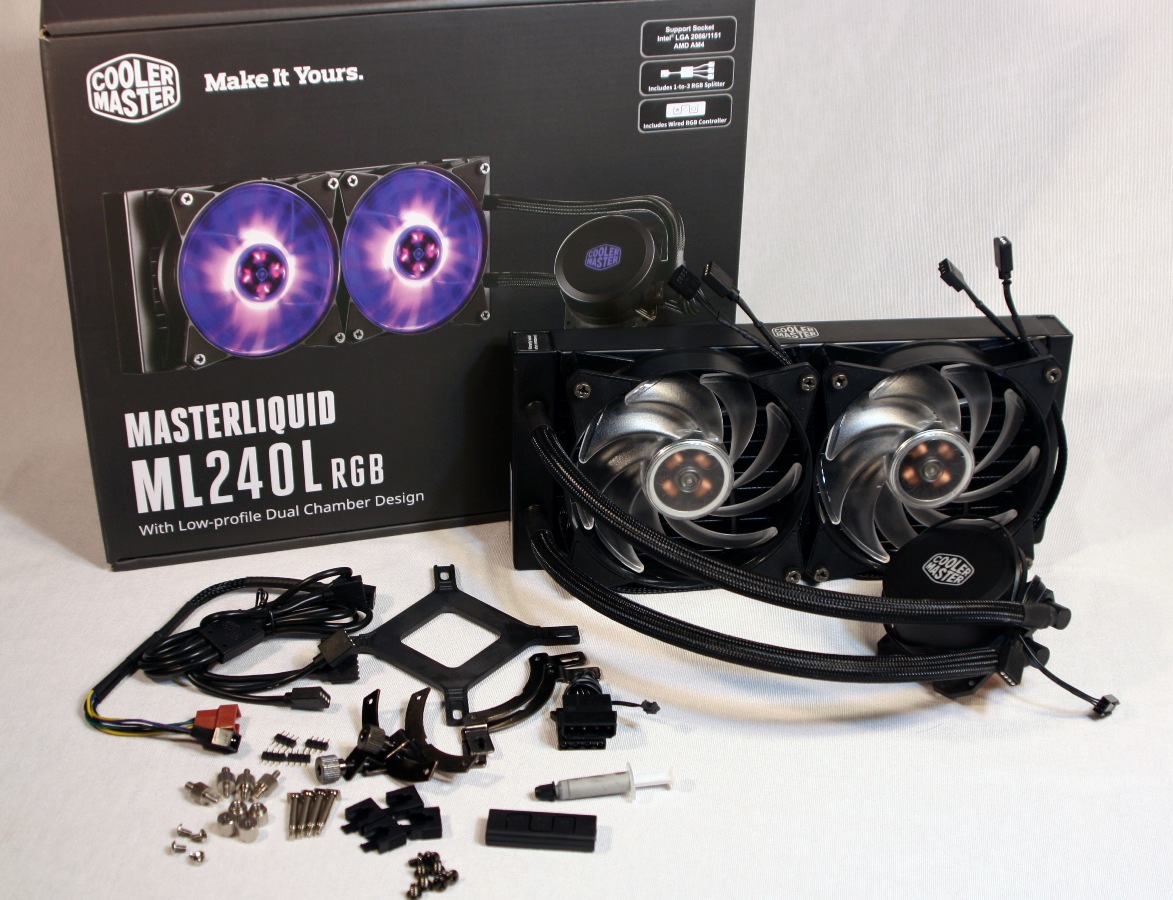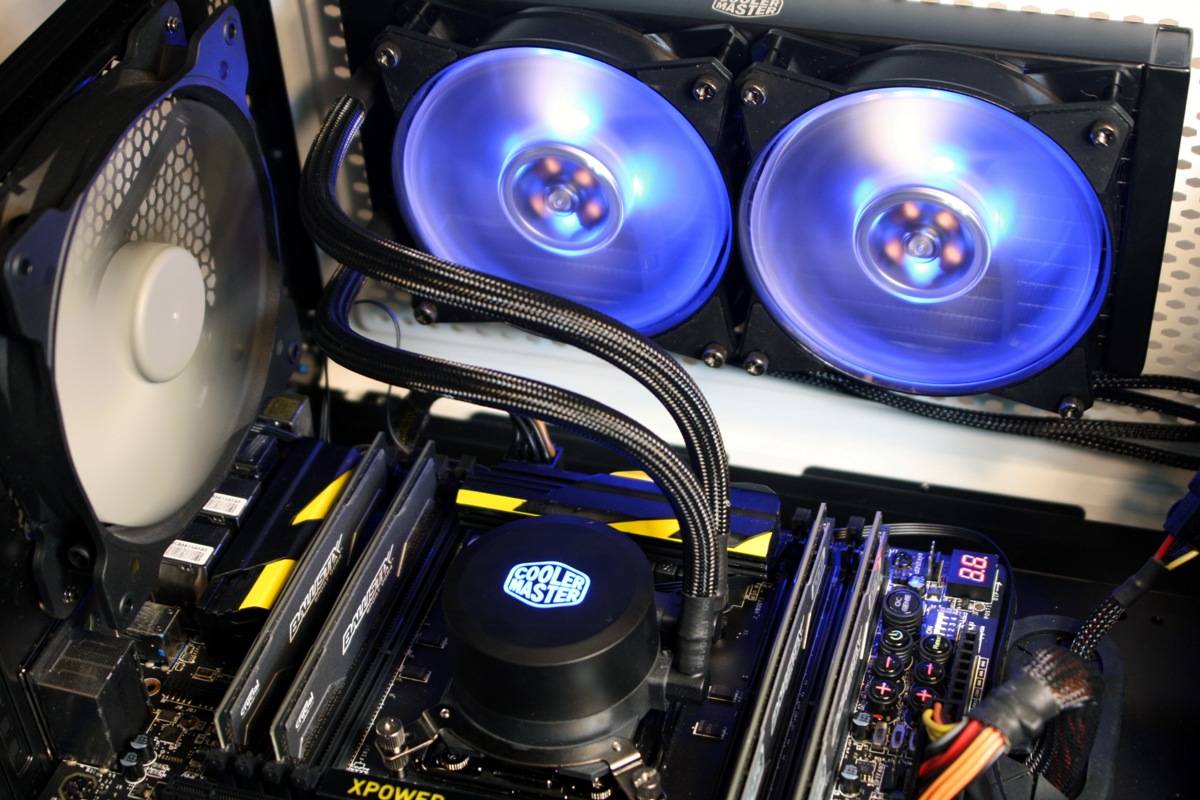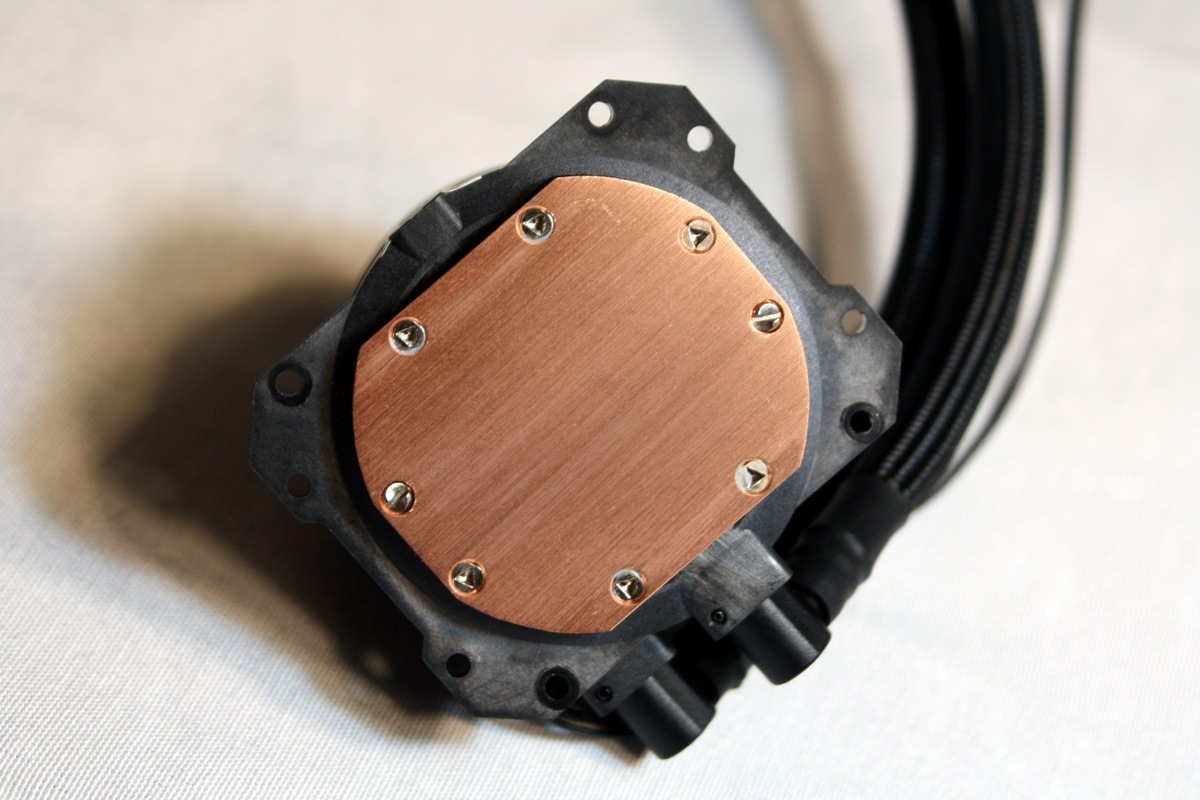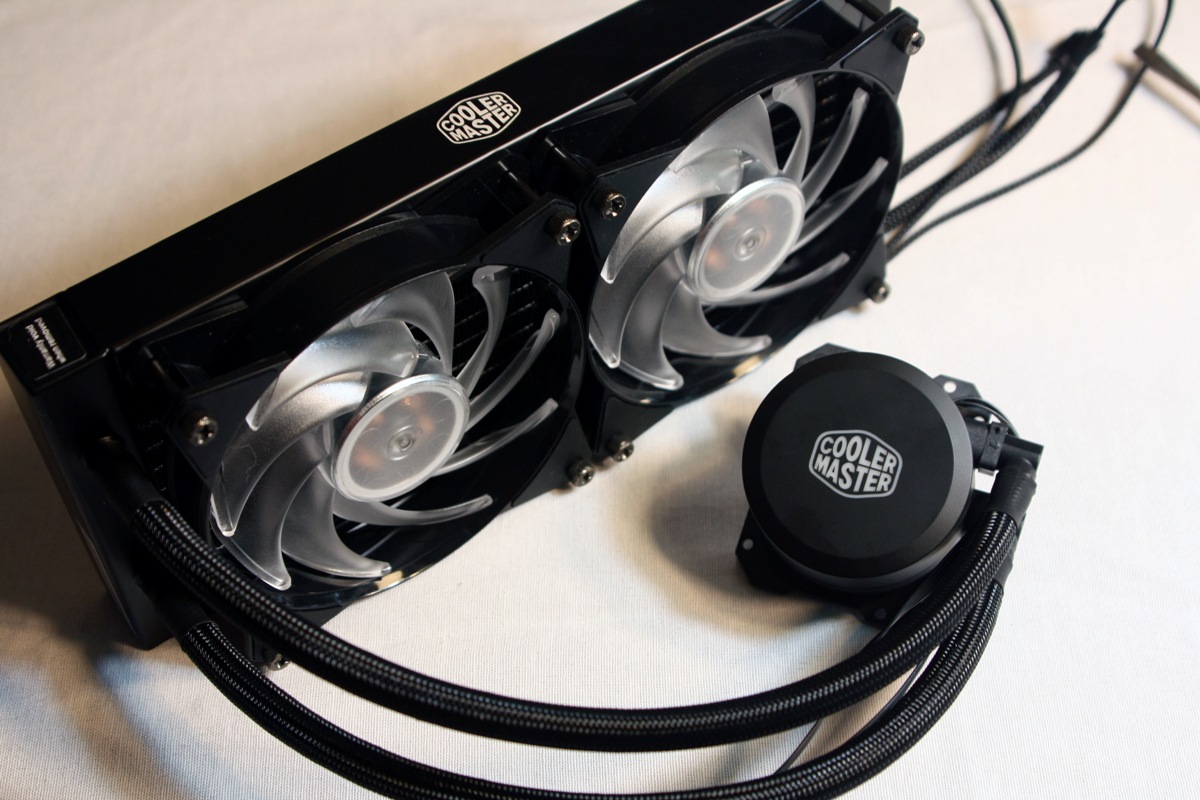Early Verdict
The Cooler Master ML240L RGB is a great performing cooler for the price point. RGB integrated functionality and minimalist design looks at home in any case.
Pros
- +
Price Point
- +
Great Performance
- +
RGB LED Motherboard Compatibility
Cons
- -
Fan Noise at 100% RPM a tad higher than average
Why you can trust Tom's Hardware
Features & Specifications
Peering over the enthusiast PC marketplace landscape, there's evidence that liquid cooling has become more commonplace. Closed-loop, all-in-one coolers provide simple-to-install, effective cooling solutions without the fuss and headaches often associated with traditional water cooling systems.
Cooler Master has recently released two new all-in-one liquid cooling units: the Master Liquid ML120L and the ML240L. As you might guess, the ML120L is a 120mm radiator unit, and the ML240L happens to sport a 240mm (2x120mm) form liquid cooler. (Note: we have a review of the 120mm unit coming soon.) PC gamers and system builders increasingly want to add the sleek, visual presence that only a liquid cooling unit provides, while ensuring a thermal design that can handle overclocking potential. Want custom color options? Cooler Master’s Master Liquid ML120L and ML240L both feature LED RGB 4-pin fans and pump display utilizing RBG integration with capable motherboards. Or you can control the color and display pattern manually via a "Molex" (4-pin ATA)-powered control module.
Put it all together and you have your cooling factor and your cool factor covered.
The ML240L design is nearly identical to that of its smaller sibling (the ML120L), sporting a matte black 240 (2x120mm) radiator with moderate FPI (folds per inch), braided nylon sleeved tubing between the pump and heat exchanger, presumably the same dual-chamber, PWM-capable pump and dual 120 AB RGB MasterFans that spin up to approximately 2000 RPM @66.7 CFM. For our testing, we will be configuring these fans to exhaust case air through the radiator and out the top of the case in a ‘push’ configuration, as opposed to a ‘pull’ setup where the fans draw air through the heat exchanger.
Specifications
The Cooler Master Master Liquid ML240L uses an all-copper cold plate with a lateral grain that would seem to favor thermal paste application inconsistencies and overall CPU socket compatibility, rather than using a machined, mirror-like mating surface to the CPU heat spreader. The pump includes mounting bracket hardware for most modern Intel and AMD sockets, apart from AMD’s TR4 Threadripper, which requires a separate mount. The pump and block unit arrives bare out of the box, requiring you to choose and install the proper mounting as needed, and the included documentation provides simple steps for configuring hardware for your specific CPU socket.
The copper CPU cold plate is devoid of the common patch of pre-applied thermal paste, and Cooler Master has opted to include a small tube of thermal compound to apply during installation, rather than having the thermal paste oxidize and dry for the weeks or months following packaging.
The ML240L utilizes the same Cooler Master 120 AB fans as its ML120L counterpart, complete with permanent, rubberized corner fan mounts and quite resourceful thumbscrews for mounting fans to the radiator. We have grown quite fond of this simple feature rather quickly, considering that you cannot always pre-mount radiator fans for every PC case, and how difficult (and potentially disastrous) normal screws can be with an erroneous slip of a screwdriver within a fully built gaming rig.
Get Tom's Hardware's best news and in-depth reviews, straight to your inbox.
MORE: Best CPU Cooling
MORE: How To Choose A CPU Cooler
MORE: All Cooling Content

Garrett Carver is a contributor for Tom’s Hardware, primarily covering thermal compound comparisons and CPU cooling reviews; both air and liquid, including multiple variations of each.
-
princemoga I just wonder what would happen if I swap my Masterliquid 240 pro fans out and get their corsair sp120 fans. Would be there any performance loss?Reply -
Crashman Reply
Try it and let us know?20489586 said:I just wonder what would happen if I swap my Masterliquid 240 pro fans out and get their corsair sp120 fans. Would be there any performance loss?
-
n0ns3ns3 Reply20489586 said:I just wonder what would happen if I swap my Masterliquid 240 pro fans out and get their corsair sp120 fans. Would be there any performance loss?
probably no significant change to any direction.
a pair of NF-F12 or NF-A12x15 would make a positive impact.
on the other hand, putting 50-60 worth of fans on another wannabe liquid cooler crap is not a good idea anyway.
-
n0ns3ns3 Is it me missing something or Tom's team is not including normalized noise results ?Reply
i mean chose some level of noise around 40db and test how good the coolers compare at this noise level. much more important in day to day usage than 50 and 100 percent of completely different fans. -
rubix_1011 Reply
FPI = FINS PER INCH NOT FOLDS PER INCH
Technically, FPI is 'folds per inch', because the radiator fins are actually folded copper or aluminum soldered between the radiator tubes, like an accordion, not individual 'fins'. However, both are generally accepted when discussing liquid cooling radiators.
Is it me missing something or Tom's team is not including normalized noise results ?
Also, for normalized noise results - not all coolers reach normalized 40dB at load. I just tested a cooler that even at full fan speeds registered just barely over 30dB. Noise level is a byproduct of cooling performance; both pump and fan RPM, both of which are easily controlled by the end user, typically by fan curves, not decibels.
i mean chose some level of noise around 40db and test how good the coolers compare at this noise level. much more important in day to day usage than 50 and 100 percent of completely different fans. -
rubix_1011 Reply20499045 said:20489586 said:I just wonder what would happen if I swap my Masterliquid 240 pro fans out and get their corsair sp120 fans. Would be there any performance loss?
probably no significant change to any direction.
a pair of NF-F12 or NF-A12x15 would make a positive impact.
on the other hand, putting 50-60 worth of fans on another wannabe liquid cooler crap is not a good idea anyway.
The cooler performed about as well as I assumed it would, especially for the cost ($70) but the real draw is the RGB lighting and motherboard integration of this control. There comes a point in diminishing returns - you can add better fans to a cheaper cooler, but by that time, it would have been better off to spend the money upfront on something higher-performing. -
n0ns3ns3 Reply20500532 said:
Also, for normalized noise results - not all coolers reach normalized 40dB at load. I just tested a cooler that even at full fan speeds registered just barely over 30dB. Noise level is a byproduct of cooling performance; both pump and fan RPM, both of which are easily controlled by the end user, typically by fan curves, not decibels.
That's true.
but no one stops from normalizing to 30 and 40 which are both comfortable.
I mean 100% fans on some coolers (H100 for example) are sound like a jet engine and no one sane would use it on a daily basis at 100%. IMHO, for the majority of users it's important to know performance on a "comfortable" noise levels regardless of the fan speed.
And yes, I know that there are many coolers that do not really reach 40db - Swiftech H2x0 X2, Arctic Freezer, Noctua 14 and 15 etc ... -
rubix_1011 That is the unfortunate reality with most boxed AIO/closed loop coolers...they only offer a cooling potential with the fans being the only variable since the flow rate and radiator are already defined.Reply
The bigger issue is that most of the marketing around these is the lack of definition of these coolers vs. actual water cooling - they are touted as 'liquid cooling' and to the uninformed buyer, any form of 'liquid cooling' must be great, because anytime you hear 'liquid cooling' it is always in the company of 'excellent cooling performance'. However, there is not a benchmark for comparison...and on purpose.



